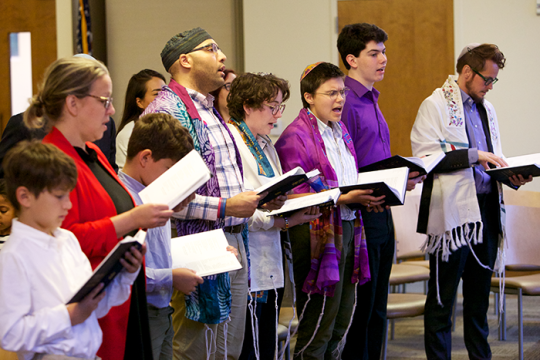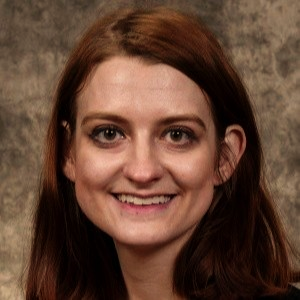
Across North America, Reform congregations are finding creative ways to strengthen community, live out Jewish values, and pursue justice. Whether investing in Jewish youth in Louisiana, turning a lighthearted NBA rivalry into community action in Indiana and Oklahoma, or building interfaith collaboration to provide local students with no-cost lunches over the summer in Georgia, URJ communities are developing engaging initiatives that create lasting change.
Engaging Future Leaders
In Metairie, Louisiana, Congregation Gates of Prayer is celebrating not only their 175th anniversary, but the third year of their innovative Gates of Camp (Go-Camp) program. This program reimburses eligible students 50% of their tuition for URJ-affiliated camps. Gates of Camp is different from a traditional scholarship or financial aid, as it utilizes an engagement-based model that encourages sustained community involvement throughout the year.
To determine eligibility, students earn “Go-Camp Phil Shekels” throughout the year by attending religious school, services, and holidays; participating in youth group; and engaging with the community. Parents, guardians, and caregivers can help their children earn points by serving on committees, singing in the choir, joining the temple brotherhood/sisterhood, and more. This engagement-based approach has helped keep young people connected to their community, camp, and Jewish identity throughout the year.
Rabbi David Gerber noted that the Gates of Camp program has allowed Congregation Gates of Prayer to send more kids to camp than ever before. This is especially impactful considering that these students have few Jewish peers to connect with at school. The initiative has also sparked consistent engagement in the congregation’s religious school program. This year, Gates of Camp helped nearly 50 students attend URJ Jacobs Camp.
Rabbi Gerber emphasized that the initiative is about “more than sending kids to camp, it’s about investing in [future] Jewish leaders.”
Turning an NBA Rivalry into Tzedakah
When the Indiana Pacers faced off against the Oklahoma City Thunder in this year’s NBA finals, three congregations turned team spirit into tzedakah with a lighthearted wager. Rabbi Vered Harris of Temple B’nai Israel in Oklahoma City, Rabbi Justin Kerber of Congregation Beth Shalom in Indianapolis, and Rabbi Brett Krichiver of Indianapolis Hebrew Congregation announced that, should the Pacers win, Rabbis Kerber and Krichiver would make a donation to the Oklahoma City-based HIAS-OKC Refugee Resettlement Program. If Oklahoma City won, Rabbi Harris would make a gift to Popsie’s Pantry, a food bank operated by Indianapolis Jewish Family Services.
The amount of the base donation was decided by the number of games played in the finals (this year, that happened to be seven games). The number of games was then multiplied by $36, as 18 and multiples of 18 are a symbol of life and good luck in Judaism. In the end, Rabbi Harris made a $252 donation to Popsie’s Pantry in celebration of the Oklahoma City Thunder taking the championship.
However, the wager didn’t stop there. All three rabbis encouraged their congregants to get in on the fun as well by matching the donation or adding to it as they were able. Rabbi Kerber also promised to send Rabbi Harris some Indianapolis 500 merchandise and will be sporting an Oklahoma City Thunder hat on the bimah during High Holiday services.
Rabbi Kerber was pleasantly surprised by how much money was raised for Popsie’s Pantry, saying, “this has to be the most unlikely, and greatest, tzedakah success of my career. If you’d said I was going to get people in Oklahoma City to give $500 to Popsie’s Pantry, I’d have said ‘you’re nuts...’ but here we are!”
This novel idea to convert hometown pride and team loyalty into charity work proved that team spirit can make a lasting impact on and off the basketball court.
Fighting Hunger with Interfaith Collaboration
In Fayetteville, Georgia, Congregation B’nai Israel is in its eighth year of partnering with the Islamic Community Center of Atlanta, the ISB (formerly the Islamic Speakers Bureau), and the Episcopal Church of the Nativity to help provide weekly no-cost lunches to local students during the summer as part of the larger Summer Lunch Program of Fayette County. Every Thursday evening, volunteers come together to pack lunches which are then delivered on Friday mornings to children enrolled in the no-cost lunch program through their schools.
While tensions between the Christian, Muslim, and Jewish communities have ebbed and flowed throughout the centuries, these faith communities in Georgia have come together to honor a core obligation they all share: feeding the hungry. Whether driven by the words of the , the Quran, or the Christian Bible, these volunteers are showing the power of interfaith collaboration in repairing the world.
Susan Burden, the program’s coordinator at Temple B’nai Israel, explained that the program has especially promoted a kinship between the Jewish and Muslim communities in a predominantly Christian area.
Burden recalled her last delivery stop of the summer, and how the student’s mother “looked at [her] with a genuine, hopeful gaze and whispered, ‘Thank you. We really needed this help.’” This year, Temple B’nai Israel and their partners helped provide lunch for over 400 students, nourishing bodies and a shared sense of community.
Whether nurturing young people’s Jewish identities, transforming friendly rivalry into tzedakah, or joining other faith communities to fight food insecurity, these congregations remind us that there’s more than one way to repair the world. Perhaps these programs will inspire you to explore innovative ways to shape leaders, strengthen your community, and pursue justice where you are.
Related Posts

Five URJ Pages to Bookmark Today

Collaboration and Connection Power Small Congregations


